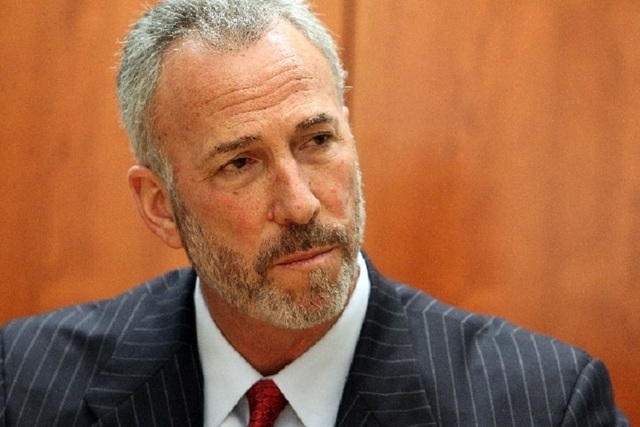Defense lawyers call for review of prosecutor rent payments
Prosecutors paying witnesses’ rent may have derailed justice for years in Clark County criminal cases, Las Vegas defense attorneys fear.
The Clark County district attorney’s office has been helping witnesses make ends meet — in some cases shelling out more than $1,000 for a victim’s bills — for nearly a decade, public records obtained by the Las Vegas Review-Journal show.
But just because records show the payments doesn’t mean defense attorneys knew. That is leading to calls for outside reviews, and one expert says not disclosing the payments could mean convictions get thrown out.
From December 2004 to now, the DA’s office authorized payments in 68 different instances from a checking account maintained by its Victim/Witness Assistance Center, which coordinates witness travel, updates victims on case statuses and refers victims to outside help. It’s unclear how many different cases are involved in these payments because the district attorney’s office redacted cases numbers and other information.
While most payments went toward rent, there were some exceptions. An $80 payment, records show, went to a cellphone bill. Another $380 went to cover Clark County high school computer courses.
District Attorney Steve Wolfson’s office defends the practice. By its count, there were a total of 56 Victim/Witness payments. Of those, 49 were for rent relocation assistance, and seven fell into the “other” category.
The DA’s office count does not include voided payments. The Review-Journal’s analysis does.
Nevada law requires witnesses to be compensated for actual costs of coming to court, but they can’t be paid for their testimony. Defense attorneys question whether covering witnesses’ rent crosses that line.
The authority for these payments — rare among the average 65,000 cases his office handles annually — comes from state law, Wolfson said Wednesday.
The Clark County DA’s office created a checking account in 1989, Chief Deputy District Attorney Thomas Carroll said, in response to Nevada Revised Statute 4.3755. It allows money collected for restitution to go into a fund for “victims of crime created by the office of the district attorney of the county in which the court is located.”
Clark County Public Defender Phil Kohn said he hadn’t heard of this statute, and no one had ever told him rent was something the DA’s office would pay for.
“Every government agency wants us to know how transparent they are, and then you find something like this,” Kohn said. “Its’ only discoverable at trial? How transparent is that?”
Carroll said his office isn’t required to disclose the payments to the defense unless the case goes to trial. Defense attorneys may not have heard about the payments because few made it to trial.
The district attorney’s office did disclose one of the rental payments on the stand at trial, according to trial transcripts, specifically asking the witness about the assistance.
EMAILS SHOW REASONS FOR RENT PAY
Reasons for rent payment vary, according to emails obtained by the Review-Journal.
In one case, an email shows, prosecutors worried a victim would not testify because of his mother’s financial hardship. So they paid her rent.
The mother had been evicted after her rent money was stolen, according to a March 17, 2008, email from Jim Sweetin, a chief deputy district attorney who oversees the sex assault team. The mother could not move in with her son, who had a mental disability, because he lived in subsidized housing.
If she moved in, Sweetin wrote to the then-head of Victim/Witness Assistance Center, he would be evicted, and they would both be homeless.
Not helping the family, Sweetin wrote, “could negatively impact our ability to secure the testimony of the victim.”
More than one DA’s office employee got involved.
“Can you do your magic, contact and do what needs to be done?” an investigator from the DA’s office said in an email to a victim advocate.
Ultimately, the office covered $400 for the room the mother rented.
That’s not the only example in which prosecutors say a witness’s living situation could hurt a case.
A victim who had been working with law enforcement and the district attorney’s office on her case got fired, Sweetin said in a Feb. 28, 2013, email.
“The Defendant appears to be taking a negotiation but that is not certain currently,” Sweetin wrote. “Thus, we have an interest in keeping the Victim in a place in which she could be contacted if needed as a witness.”
A $500 check went to the victim’s apartment complex.
In February 2009, the DA’s office approved $500 in “emergency rent” for a victim. But no one ever picked up the check, and it had to be voided.
EXPERTS QUESTION PAYMENTS
Asking for records of benefits — anything that could appear to make a witness biased — is routine for any criminal case.
But rent is not a specific benefit Kohn said he would think to ask about.
And, he said, he shouldn’t have to.
“They have never, ever understood when we ask for any benefit, we mean any benefit,” Kohn said about the district attorney’s office. “I have no idea what questions we’re not asking to make the magic box open up.”
Kohn said there could be a legitimate reason for the payments, but his office can’t ask if it doesn’t know about them.
Wolfson said part of his responsibility is to provide limited aid to crime victims.
“It’s not like they are staying at The Mirage. It’s not like they are staying and we are giving them per diem monies to eat at fancy restaurants,” Wolfson said. “It’s literally, one could say, a life or death situation.”
Carroll said assistance typically comes in the form of a one-time check payment to a landlord. The Review-Journal’s investigation found the same to be true.
Several Las Vegas defense attorneys contacted by the Review-Journal who had a case where a payment was made said they had no idea about the potential benefit to witnesses. Many were surprised rent was something the DA’s office would cover.
“I think it is one of those things, if they are going to have a program like that, it should be vetted so it doesn’t become abused,” defense attorney Joseph Scalia said.
He questioned whether the district attorney has the authority to make such payments.
“Paying somebody’s rent is very close to paying witnesses to testify,” he said.
Witnesses in a 2009 case against a client Gabriel Grasso represented received a combined $500 payment, records show.
Grasso called the payments witness tampering and blatantly illegal.
But Grasso added that prosecutors did not play hardball with him, but he noted the case relied largely on witness testimony.
“The thing that upsets me the most is it is not a level playing field,” he said. “The prosecution gets to do this and we don’t.”
Grasso said the State Bar of Nevada should conduct an immediate inquiry and establish ground rules for witness compensation that both sides must live by.
Kohn said he thought the state attorney general should investigate.
Experts echoed the need for an investigation.
“It looks troublesome at best and maybe criminal at worst. It’s hard to say,” said Bennett L. Gershman, a professor at Pace Law School in White Plains, N.Y., who has written several articles and two books on prosecutorial misconduct.
“I think right now there needs to be some kind of inquiry.”
Legal ethicist and clinical law professor Ellen Yaroshefsky agreed. The State Bar of Nevada could handle individual complaints or look at the entire office. The attorney general’s office also could investigate, she said.
“Someone needs to take this up — and the question is who is going to report them,” said Yaroshefsky, a professor at Cardozo Law School in New York City.
Yaroshefsky said prosecutors not disclosing the payments is a problem, but whether the payments are allowed at all is an interesting question.
Nevada law requires witnesses to be given a $25 fee for court appearances and, in some cases, a per diem. Witnesses from within the court’s jurisdiction are entitled to compensation for mileage to and from court. Witnesses from beyond the jurisdiction are “entitled to reimbursement for the actual and necessary expenses for going to and returning from the place where the court is held.”
Nevada has a Victims of Crime Program to help with housing, medical care, lost wages and other hardships. Victims must meet certain criteria to be eligible and may appeal the program’s decision.
“It’s unusual for a prosecutor to be paying a witness’s rent,” Gershman said. “You don’t pay witnesses for these kind of expenses.”
The payments could cause convictions to be vacated if they weren’t disclosed, Gershman said.
WOLFSON DEFENDS PRACTICE
The records obtained by the Review-Journal date to December 2004.
Wolfson said he can only speak to his past two-and-a-half years in office but that he’s not concerned the payment system has been abused during that time.
But if something concerning is brought to his attention, he said, he’ll give it a look.
Wolfson said if something wasn’t disclosed at trial, defense attorneys could file an appeal. Wolfson said he is confident that a higher court would find that a payment had not affected case outcome even if the perceived benefit had not been disclosed when it should have been.
Wolfson requested an audit of his office’s witness payments voucher program after it came to light that the D.A.’s office kept shoddy records of vouchers used to pay court fees, travel expenses, mileage and meals. It was completed in May.
Witness payments came up during a trial in October 2013, when defense attorneys Dan Bunin and Dayvid Figler, who had raised concerns about how the DA’s office had compensated witnesses in the past, asked to see documents of all payments. They were told the records had been destroyed, but not told that copies of the records were on file with the county.
“There are a lot of interesting questions and every time we learn more about this there are more questions than answers,” Bunin said. “I have no idea what incentives they give any more. I would not have thought they were paying anyone’s rent.”
Defense attorney Josh Tomsheck is handling the appeal of a 2011 sex-with-a- minor case in which a witness received payments.
Tomsheck, a former Clark County prosecutor, said he didn’t know much about Victim/Witness payments, which weren’t a part of plea negotiations when he was with the DA’s office. So he didn’t think much about it when Bunin and Figler raised the issue in October.
“When the whole story came out, it didn’t seem like a big deal to me,” Tomsheck said. “In hindsight it probably is.”
Contact Bethany Barnes at bbarnes@reviewjournal.com or 702-477-3861. Find her on Twitter: @betsbarnes.

















